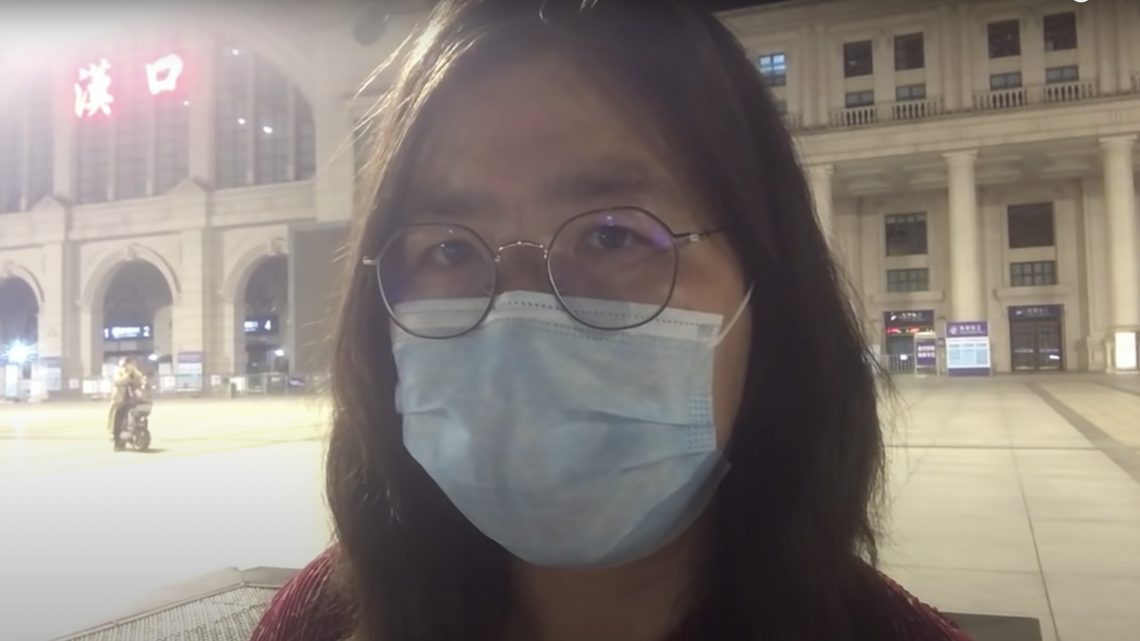
China Jails Reporter Who Covered Wuhan Outbreak. Her Crime? Journalism.
December 28, 2020A Chinese court has sentenced a citizen journalist to four years in prison after she reported independently on the COVID-19 crisis from its first epicenter, illustrating Beijing’s intent to maintain a tight grip on the narrative of the pandemic as it seeks to defend its early response to the emergence of the virus.
A former lawyer, Zhang Zhan had been detained for seven months before she was sentenced on Monday by the Shanghai Pudong People’s Court, according to her lawyers. She was accused of “picking quarrels and provoking trouble,” a vaguely-defined charge that the Chinese government often uses to silence critics.
Zhang, 37, was among several Chinese citizens who took it upon themselves to travel to the central Chinese city of Wuhan early this year to report on the government’s handling of the outbreak, filming inside hospitals and on empty streets as the Wuhan authorities enforced a strict lockdown. In doing so, they challenged the Chinese state’s monopoly on spreading information about the outbreak through its control of media outlets and a sophisticated system of censorship, including the manipulation of social media.
At least three other citizen journalists, Chen Qiushi, Fang Bin and Li Zehua, have disappeared from public view after documenting the situation in Wuhan.
The continued suppression of independent voices could fuel skepticism, particularly from Western democracies, of China despite its efforts to repair its image, in part through supplying coronavirus vaccines to poorer countries.
“The Chinese government keeps boasting about how they have defeated the coronavirus pandemic, but if that was the truth, why are they so afraid of the reports produced by citizen journalists?” said Wang Yaqiu, a China researcher at New York-based Human Rights Watch.
‘Hopelessly persistent’
Armed with nothing more than a smartphone, Zhang Zhan went to Wuhan in early February shortly after the city enforced one of the world’s strictest lockdowns.
“At first, she didn’t know how to upload videos to YouTube,” Li Dawei, a human rights lawyer from China’s Gansu province, told VICE World News. “But once I showed her how to do it, she began to upload videos that she recorded in Wuhan to YouTube and Twitter on a daily basis.”
In one video, Zhang showed a hospital hallway packed with patients lying on beds, some of them hooked up to blue oxygen tanks. In other videos, Zhang went to local police stations in Wuhan to inquire about other missing citizen journalists, including Chen Qiushi and Fang Bin.
Her videos stood in stark contrast to state media’s reports on the outbreak, which initially glossed over the severity of the virus and sought to highlight the heroic efforts of medical workers in treating patients.
Zhang’s insistence to go to Wuhan and document the situation on the ground worried her friends.
“I worried that Zhang Zhan might be infected in Wuhan and I also worried about her personal safety,” said Peng Yonghe, a human rights lawyer in Shanghai, referring to the possibility of arrest.
“I asked her to return to Shanghai, but she insisted on staying in Wuhan, because she believed that was the right thing to do at the time,” Peng told VICE World News. “Zhang Zhan is hopelessly persistent.”
After spending almost two months in Wuhan, Zhang Zhan tweeted on April 1 that she was being closely watched by four strangers at her hotel.
“Not too many people are staying at my hotel. I think at least four of them are here to surveil me,” she wrote in one tweet.
Zhang Zhan uploaded her last video to YouTube on May 14 before losing contact with her friends.
In the video, which was dated May 13, Zhang explained what drove her to keep filming despite the risk of infection and arrest.
“The people that I’ve met and the things that I’ve witnessed in Wuhan have allowed me to speak up for them,” Zhang said in the video.
On May 15, police brought her luggage in Wuhan to her parents’ home in Shanghai, telling them that she was detained.
Of the three other citizen journalists who fell from public view, Fang Bin’s whereabouts remain unknown. Chen Qiushi was reported in September to have been placed under surveillance at his parents’ home.
Li Zehua appeared in a video uploaded to his YouTube channel in April, saying he was detained but the police ultimately decided not to charge him. He has not posted another video since.
Detained and defiant
Even as she was detained, Zhang Zhan was adamant that she did nothing wrong.
She began a hunger strike in June, refusing to plead guilty or comply with investigators, said Zhang Keke, one of Zhang Zhan’s former defense lawyers. (The Zhangs are unrelated.)
The lawyer said officers at the detention center force-fed her with a nasal tube. Her hands were restrained at her waist in order to prevent her from removing the tube, he told VICE World News.
“When I saw her in the beginning of December, she was suffering from dizziness, headache and stomach ache,” the lawyer said. “The last six months have been a painful and torturing process for her, but she still refused to give in.”
Ren Quanniu, another of Zhang’s lawyers, said she “looked pale and a lot older” during a recent visit.
“I could hardly recognize her,” Ren told VICE World News. “However, she believes that going on a hunger strike is a way to protest her unjust detention and the best way to express her dissatisfaction toward all the ‘sins’ that the Chinese government has committed.”
When told that she could be imprisoned, Zhang Keke said, Zhang Zhan “quoted a passage from the bible and said she would expect herself to die in prison.”
“One of the reasons why she began the hunger strike was because she couldn’t accept the fact that she was punished for exercising her freedom of speech, a right laid out in the Chinese constitution,” he said. “She has made up her mind that she wouldn’t comply with the trial, because she views compliance as an insult to herself.”
The jailing of Zhang came amid Beijing’s push to portray itself as a success story in containing the coronavirus, often contrasting itself with the failures of democracies such as the United States.
This narrative has found a receptive audience in China, where many are proud of how the country turned around the crisis.
From being the worst-hit country in the world, China has managed to contain subsequent outbreaks through a combination of mass mobilization and strict enforcement of quarantine and restrictive measures. Now it has positioned itself as the main supplier of vaccines to the developing world.
On the morning of Zhang’s sentencing, a top trending topic on Twitter-like Weibo was about COVID-19: a video of a nurse in a Houston hospital recounting the horrors of being infected and witnessing countless deaths. The topic was viewed 160 million times.
A search of “Zhang Zhan” on the site returned 10 posts in total.
Under one of the posts about Zhang, by Ren Quanniu, a commenter said, “Those who gather firewood for the people shall not be left to freeze to death.”

